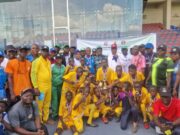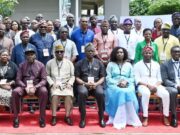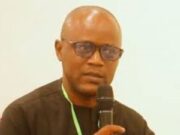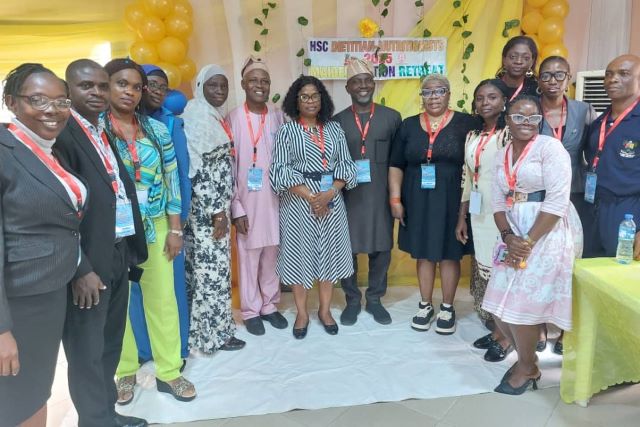Registered Dietitians-Nutritionists working in Lagos State-owned hospitals have urged the state government to ensure they have better representation in hospital management structures across the state.
They stressed that their exclusion from key decision-making roles undermines patient care and limits their professional contributions to the health sector.
Speaking at the 2025 Maiden Edition of Lagos Dietitian-Nutritionists Retreat, the Director and Head of Department, Dietetics and Nutrition, Lagos State Health Service Commission, Mrs Nwankwo Jessie, stressed the critical role of DNTs in disease prevention, inpatient management, and long-term recovery.
She argued that their inclusion in hospital management teams would not only improve service delivery but also strengthen interdisciplinary collaboration across clinical units.
Jessie urged the government to implement policies that recognise their expertise and provide equal leadership opportunities across all cadres of healthcare workers.
“The way forward is for them to accord us the necessary support and then give us a place so that the issue of promoting general well-being, prevention of diseases, and treatment of diseases, which is on the high increase, not just for Lagos purposes but for humanity, can be addressed and we can deliver excellent services.
“If we are given our due position and all the necessary support, especially in terms of inpatient feeding, of course, manning the therapeutic kitchen and looking at their condition, giving them what aligns with their disease condition and with their preferences, they (patients) will be able to bounce back quickly.
“And then, on the aspect of the outpatient, if we are in the right position and have the necessary support, you will find that we are able to prevent a lot of diseases, both non-communicable and communicable. Because our diet is not just about antibiotics, it’s about the phytochemicals that work on the cells and tissues and ensure the immune system works at an optimal level. So, a lot of diseases will be prevented,’ the HOD said.
Also, the retreat Keynote Speaker, a former Nigeria Society of Physiotherapy President, Dr Felix Faniran, said DNTs are crucial to the healthcare industry.
According to him, dietitians and nutritionists are extremely important healthcare professionals in the health sector because their services to the community are essential.
“Unfortunately, in Nigeria today, they are not well represented in many hospitals, not to talk of the primary health care centres where we have a large number of people residing,” the retired physiotherapist noted.
He noted that DNTs absence at primary healthcare centers are contributing to the burden of diseases across the country.
“That’s exactly where we need them more, so that they can provide preventive services. If we are able to prevent most of these conditions like diabetes and high blood pressure, many people would not need high-maintenance services at secondary and tertiary levels. So, there’s a need for them to be there,” Faniran said.
He also called on the government to set up a regulatory body for dietetics and nutrition practice across the country.
“It is highly important and long overdue. If a regulatory council is established for them by the government, that body will be able to create standards of practice and protect the public from quackery, such that only adequately trained and certified persons will render their services to the people, thereby preventing dangers and disease.
“As members of the allied health care professionals, it has been observed that the Nigerian health system has cut off allied health professionals from top management positions in the health sector.
“This, compared to what happens in the US, UK, Australia, and other parts of the world, is not helping the Nigerian health system. The Nigerian government should give stronger recognition to dietitians and other allied healthcare professionals who are currently being deprived of contributing at top management levels.
“They should be qualified and allowed to serve as Chief Executive Officers of hospitals, rather than restricting that position to only one professional group. That kind of monopoly does not help any system,” Faniran said.
On his part, the Director, Medical Services, Lagos State Health Service Commission, Dr. Olawale Adegbite, urged the DNTs to collaborate in optimising their impact.
Adegbite emphasised the vital roles dietitians and nutritionists play in clinical nutrition, disease prevention, and the management of non-communicable diseases.
“Dietitians and nutritionists have defined roles within the health system, but their visibility and influence remain limited. There is a need for stronger collaboration with hospital management to optimise their impact.
“The profession still faces issues such as under-representation in policy and decision-making, limited visibility in workforce planning, inadequate funding, and a lack of strategic deployment and professionalism,” Adegbite said.
He urged the professionals to deepen continuous stakeholder engagement at all levels, including proactive advocacy and evidence-based impact documentation, and stronger collaboration.
The director of clinical services encouraged the DNTs to speak up for their profession, be present where health decisions are made, build alliances, and drive policy with data and evidence.
“Nutrition is health. The voice of dietitians and nutritionists must be heard, starting from within the profession. The Lagos State Health Service Commission stands ready to support and partner with practitioners to elevate nutrition and improve health outcomes,” Adegbite said.
On her part, the Retreat Committee Chairman, Dietitian Akinlonu Olusola, said the retreat was to bridge the gap and break barriers.
“Over time, we’ve realised that certain things are playing out, especially in the healthcare system. We face the challenge of being accepted by other clinicians.
“Doctors want to do our job, nurses want to do our job. So, we don’t have that environment of a multi-disciplinary approach to medical care,” she said.
Olusola added, “We have the barrier of not having the right equipment. There’s no way you can manage patients without equipment. There’s no way you can tell patients to do certain things regarding their diet without the right tools.
“Every medical professional or clinician has a role to play. And they are supposed to have a conducive environment to work in.”
Credit: punchng.com









































































